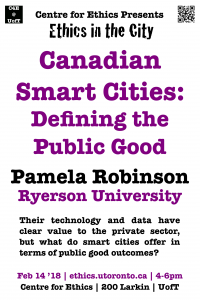- Tue, Feb 13, 2018
Ethics of AI in Context
Ethics of AI in Context: Richard Zemel, Ensuring Fair and Responsible Automated Decisions Information systems are becoming increasingly reliant on statistical inference and learning to render all sorts of decisions, including the issuing of bank loans, the targeting of advertising, and the provision of health care. This growing use of automated decision-making has sparked heated debate among philosophers, policy-makers, and lawyers, with critics voicing concerns with bias and discrimination. Bias against some specific groups may be ameliorated by attempting to make the automated decision-maker blind to some attributes, but this is difficult, as many attributes may be correlated with the particular one. The basic aim then is to make fair decisions, i.e., ones that are not unduly biased for or against specific subgroups in the population. I will discuss various computational formulations and approaches to this problem.
Information systems are becoming increasingly reliant on statistical inference and learning to render all sorts of decisions, including the issuing of bank loans, the targeting of advertising, and the provision of health care. This growing use of automated decision-making has sparked heated debate among philosophers, policy-makers, and lawyers, with critics voicing concerns with bias and discrimination. Bias against some specific groups may be ameliorated by attempting to make the automated decision-maker blind to some attributes, but this is difficult, as many attributes may be correlated with the particular one. The basic aim then is to make fair decisions, i.e., ones that are not unduly biased for or against specific subgroups in the population. I will discuss various computational formulations and approaches to this problem.
[☛ eVideo]
Richard Zemel
04:00 PM - 06:00 PM
Computer Science & Vector Institute
University of Toronto
Centre for Ethics, University of Toronto
Rm 200, Larkin Building - Wed, Feb 14, 2018
Author Meets Critics
Author Meets Critics: Mara Marin Connected by Commitment: Oppression and Our Responsibility to Undermine It (Oxford 2017)
Connected by Commitment: Oppression and Our Responsibility to Undermine It (Oxford 2017)Mara Marin
Postdoctoral Affiliate, Centre for Ethics
University of TorontoCommentators:
Shannon Dea (Philosophy, University of Waterloo)
Kerry Rittich (Law, University of Toronto)
Meredith Schwartz (Philosophy, Ryerson University)
Torrey Shanks (Political Science, University of Toronto)
Saying that political and social oppression is a deeply unjust and widespread condition of life is not a terribly controversial statement. Likewise, theorists of justice frequently consider our obligation to not turn a blind eye to oppression. But what is our culpability in the endurance of oppression?
In this book, Mara Marin complicates the primary ways in which we make sense of human and political relationships and our obligations within them. Rather than thinking of relationships in terms of our intentions, Marin thinks of them as open-ended and subject to ongoing commitments. Commitments create open-ended expectations and vulnerabilities on the part of others, and therefore also obligations. By this rationale, our actions sustain oppressive or productive structures in virtue of their cumulative effects, not the intentions of the actors.When we violate our obligations we oppress others.
12:00 PM - 02:00 PM
Centre for Ethics, University of Toronto
Rm 200, Larkin Building - Wed, Feb 14, 2018
Ethics of AI in Context, Ethics in the City
Canadian Smart Cities: Defining the Public Good (Ethics in the City Series) From the federal government’s smart city challenge to Sidewalk Labs‘ partnering with Waterfront Toronto on the planning of Quayside, smart cities are part of a new urban agenda in Canadian cities. Their technology and data have clear value to the private sector but what do smart cities offer in terms of public good outcomes? This talk will explore how early experiments with smart cities send signals that deliberate and creative attention must be paid if we seek to derive public good from this technology.
From the federal government’s smart city challenge to Sidewalk Labs‘ partnering with Waterfront Toronto on the planning of Quayside, smart cities are part of a new urban agenda in Canadian cities. Their technology and data have clear value to the private sector but what do smart cities offer in terms of public good outcomes? This talk will explore how early experiments with smart cities send signals that deliberate and creative attention must be paid if we seek to derive public good from this technology.Pamela Robinson
Associate Dean, Graduate Studies and Strategic Initiatives, Faculty of Community Services
04:00 PM - 06:00 PM
Centre for Ethics, University of Toronto
Rm 200, Larkin Building
Centre for Ethics, University of Toronto
Where conversations about ethics happen.
